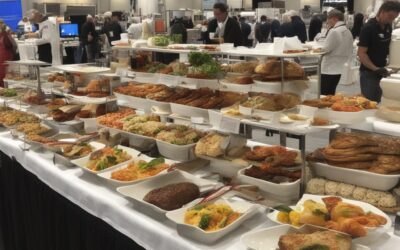As we continue to ride the wave of technological advancements, one cannot help but be amazed at the ways these developments permeate every aspect of our lives. Food and beverage events, a cornerstone of social gatherings and professional networking, have not been immune to this revolution. In fact, these events have been transformed into innovative platforms where creativity meets cutting-edge technology. As we dive into this fascinating topic, we will explore ten areas where technology has left an indelible impact on food and beverage events.
1. The Rise of Virtual Events
First and foremost, the advent of virtual events has fundamentally reshaped the way we conceptualize and execute food and beverage events. With the world becoming more interconnected through technology, location, and distance have ceased to be barriers. Event organizers have harnessed technology to create virtual platforms that simulate the experience of physical gatherings, offering interactive features like live chats, Q&A sessions, and even virtual wine tastings.
These platforms are not just about convenience, they also open up possibilities for greater inclusivity. People from all over the world can participate, learn, and network without the financial and time commitments of travel. This means that your event can reach a broader audience, fostering a more diverse and global conversation around food and beverage trends.
2. Augmented and Virtual Reality
The second point of impact is the integration of Augmented Reality (AR) and Virtual Reality (VR) into food and beverage events. Imagine being able to walk through a virtual vineyard, learn about different grape varieties, and then taste the wines produced from these grapes – all from the comfort of your own home. This is now possible thanks to advancements in AR and VR technology.
These technologies not only create immersive experiences but also help in conveying complex information in a visual and engaging manner. For instance, AR can be used to overlay information about a wine’s origin, grape variety, and tasting notes onto the wine bottle, enhancing the tasting experience and providing valuable information in a digestible format.
3. Sustainable Practices and Waste Management
In recent years, there has been a growing awareness and concern for our environment. Technology has played a pivotal role in addressing these concerns within the food and beverage industry. From reducing carbon footprint to managing waste, sustainable practices have become increasingly important.
For example, event organizers are now using software to calculate the carbon footprint of their events and identify areas where they can reduce their impact. Moreover, digital platforms have made it easier to track and manage waste, leading to more efficient use of resources and less food waste. This not only helps in protecting our environment but also makes financial sense, as reduced waste leads to cost savings.
4. Personalization Through Big Data
Big data has revolutionized many industries, and food and beverage events are no exception. Event organizers can now collect and analyze data from various sources to understand attendee preferences, dietary restrictions, and consumption patterns. This data can then be used to create personalized experiences for attendees.
For instance, by analyzing data from previous events, organizers can predict which foods and beverages will be popular among attendees and adjust their menu accordingly. Similarly, information about dietary restrictions can be used to ensure that there are suitable options for everyone, enhancing attendee satisfaction and engagement.
5. Online Ticketing and Event Management Platforms
The days of physical tickets and paper-based event management are long gone. Online ticketing and event management platforms have streamlined the process of organizing food and beverage events, making it more efficient and less prone to errors.
These platforms offer a range of features, such as online registration, payment processing, attendee tracking, and feedback collection. Furthermore, they provide real-time data that can help organizers make informed decisions and adjustments. This, in turn, leads to better event planning, execution, and post-event analysis.
6. Interactive Food and Beverage Stations
The sixth point of impact is interactive food and beverage stations. Technology has turned these stations into engaging and educational experiences. For example, touchscreen displays can provide detailed information about the ingredients, preparation methods, and nutritional value of each dish. Similarly, interactive wine stations can provide information about the origin, grape variety, and tasting notes of each wine.
These stations not only enhance the attendee experience but also promote transparency and education. Attendees can learn more about what they are consuming and make informed choices based on their preferences and dietary needs.
7. Robotics and Automation
It’s not a sci-fi movie; robots are serving food and drinks at events. Robotics and automation have been gradually integrated into the food and beverage industry, and events are no exception. From robotic bartenders to automated food preparation systems, these technologies are enhancing efficiency and creating unique experiences for attendees.
For instance, robotic bartenders can mix and serve drinks with precision and consistency, reducing wait times and improving service quality. Similarly, automated food preparation systems can produce a wide range of dishes quickly and efficiently, ensuring that attendees always have access to fresh food.
8. Mobile Apps for Enhanced User Experience
Mobile apps have become an essential tool for enhancing the user experience at food and beverage events. These apps can provide a wide range of features, such as event schedules, venue maps, menu details, and personalized recommendations based on user preferences.
For instance, an event app can send notifications to attendees about upcoming sessions or tastings that they may be interested in. Similarly, the app can provide details about the dishes and wines being served, including information about ingredients, preparation methods, and pairing suggestions. This not only enhances the attendee experience but also promotes engagement and interaction.
9. Social Media and Influencer Marketing
Social media has transformed the way we communicate and share experiences, and food and beverage events are no different. Platforms like Instagram, Facebook, and Twitter are not only used for promoting events but also for engaging attendees before, during, and after the event.
Moreover, influencer marketing has become a powerful tool for reaching a larger audience. By collaborating with influencers in the food and beverage industry, event organizers can extend their reach and attract more attendees. Additionally, influencers can provide valuable content, such as live streams, interviews, and reviews, that can enhance the visibility and credibility of the event.
10. Smart Wearable Technology
Last but not least, smart wearable technology is making its way into food and beverage events. From smart wristbands that serve as entry tickets and payment methods to wearable devices that track food and beverage consumption, these technologies are enhancing convenience and efficiency.
For instance, smart wristbands can reduce wait times at entry points and payment counters, improving the overall attendee experience. Similarly, wearable devices can provide valuable data about consumption patterns, which can be used to improve event planning and execution.
In conclusion, technology is not just changing food and beverage events; it’s revolutionizing them. It’s creating opportunities for more inclusive, engaging, and sustainable events. As we continue to embrace these advancements, one can only imagine what the future holds for food and beverage events. Here’s to a future filled with innovation, creativity, and delicious experiences!
We welcome any suggestions or questions. You can email us or contact us using the contact page.
You can also connect with us on the following social networks:









0 Comments